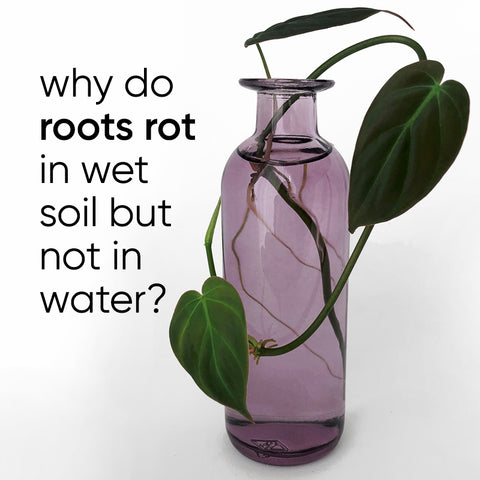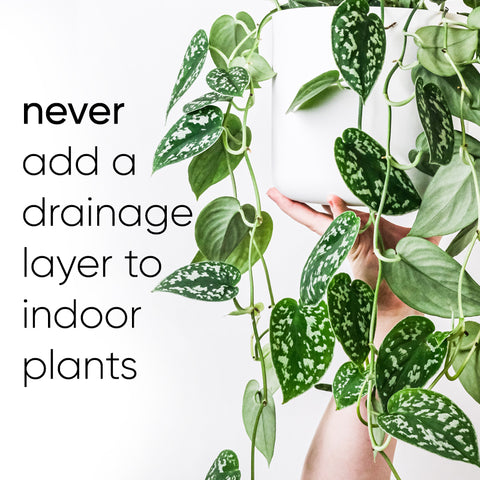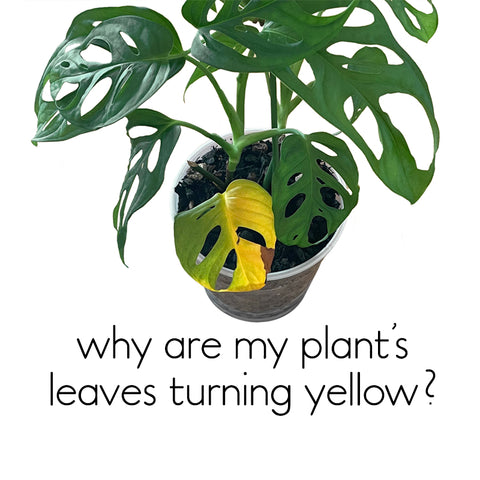This never used to make sense to me. Why do roots rot in soil when over-watered yet they don’t rot when grown in water? Firstly, turns out roots DO rot in water too, and for the same reason as they do in soil, BUT (as it often is with plants), it's not quite that simple. Here's what's going on under the surface...

First-up, a quickie about over-watering, since it's the most-blamed cause of root rot. Over-watering is NOT caused by how much water you give your plants, but how often. When I water I always thoroughly saturate the soil. I usually top water, and don't stop until water pours out the drainage holes. If I do I bottom-water, I soak until the top surface of the soil is wet. So either way, I fully saturate the substrate when I water. That way some roots don't miss out (which can cause roots to die and rot from under-watering instead!). It's actually watering too often or too soon, before the substrate's had a chance to dry out - or when soil stays wet too long - that adds up to bad news for roots.
That’s because roots need oxygen. If you fill up the air space in their soil with water, and it stays wet too long, say bye bye to oxygen and hello to root rot!
What causes root rot?
Root rot can happen due to two main causes, either biotic (living organisims like bacteria or fungi), or abiotic (such as over-watering drowining the roots). Both have in common a lack of oxygen.
Over-watering is the main abiotic cause of a lack of oxygen in soil, but poor drainage or choosing the wrong type of soil can also be a common reasons that trip up plant parents, both causing soil to stay wet too long.
Less well-known but just as much to blame for root rot, are types of bacterial and fungal infections that attack the roots. They love moist, low-oxygen environments. There are a few that could be at work, with Pythium spp., Phytophthora spp., Fusarium spp., and Rhizoctonia solani. four of the more common culprits.
Either way, the common factor you want to avoid is a lack of oxygen.
Why do roots rot in wet soil?
When those air pockets in soil are filled with water, there's less room for oxygen. Whether the root rot is caused by bacteria or fungi, they both love an anaerobic (low oxygen), environment too. Oxygenated water - and soil that regularly dries out – keeps up that oxygen supply, keeping bad bacteria and fungus at bay, preventing rot.
The right soil or substrate is extra important in potted indoor plants as excess water doesn't drain away from roots like it does outdoors (another reason the same plant grown outdoors often needs soil with a higher water-holding capacity than when grown indoors or in a pot). Keep in mind adding a 'drainage layer' to a potted plant can INCREASE the risk of root rot due to creating a perched water table that lifts water up closer to the roots. More about the myth of drainage layers and why to avoid them >
And yes, under-watering CAN cause root rot too. If roots stay dry too long, root hairs can die. That can be caused by not watering enough (it's best to water until all the substrate is wet), or by not watering often enough. If the root hairs die, when you water again, the roots can’t absorb the water, the soil stays wet longer than usual, and root rot comes knocking.
A key decision you can make to prevent root rot in indoor plants is choosing a fluffy or chunky mix that makes over-watering almost impossible by keeping space for air, even when wet.
But what about roots growing IN water? Why don’t they rot?
Water roots have adapted to growing in water but are NOT a different type of root. It's an adaptation. Shade leaves are a good example of an adaption. Take two Monstera, grow one outdoors in a spot that gets direct sun vs the other grown indoors in bright indirect light. The ‘shade leaves’ of the indoor Monstera will burn if shifted to direct sun too fast. Same leaves, but they need time to adapt.
Water roots need time to adapt to soil (and vice versa). That's also why a rooted cutting left in water too long has a harder time adapting when shifted to soil. If you know you'll be growing the plant in soil, keeping a cutting in water too long isn't good. You ideally want to pot up a rooted cutting when the roots are about 5cms long, and ideally just after they start branching. How to propagate indoor plants in water >
If you’ve ever seen a soil-grown plant send its roots out into water, you’ll see how the roots change once they find water, becoming smaller, whiter, thinner and more hairy.
What are the differences between soil roots and water roots?
Soil roots need more energy to grow, which is why cuttings grow roots faster in water vs soil. Soil roots are tougher and thicker. Water roots are thinner and more delicate. Water roots have more hairs so they’re able to absorb oxygen when submerged in water. Soil roots have adapted to get their oxygen from the air.
When growing in water, top up with fresh water frequently, or entirely change the water about weekly, otherwise the oxygen gets depleted. And yes, water roots CAN get root rot and die too. If you plan to grow a plant in water long-term, consider adding an oxygen source, such as an air pump and bubble stone.
There's a lot more going on below the surface that you might realise, but I hope this guide helped explain why roots rot in wet soil, the difference between soil roots and water roots, and ways to prevent root rot in your indoor plants - Anna :)
Keep learning
Why drainage layers can kill indoor plants >
What causes yellow leaves and how to fix it before it's too late >


